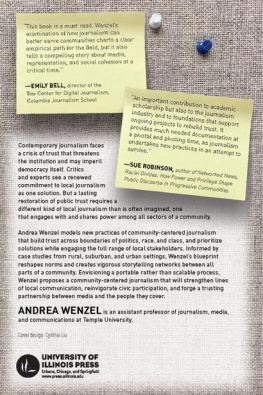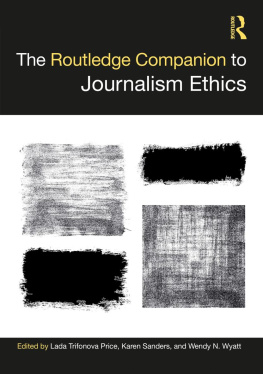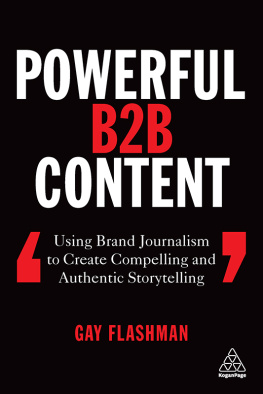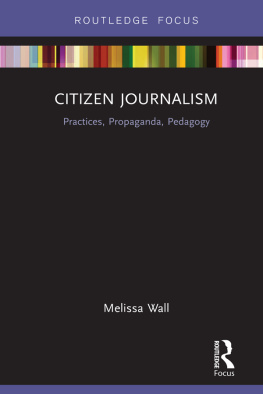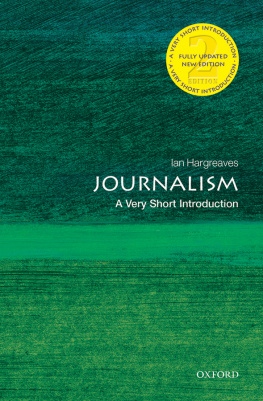Community-Centered Journalism
Community-Centered
Journalism
Engaging People,
Exploring Solutions,
and Building Trust
ANDREA WENZEL
2020 by the Board of Trustees
of the University of Illinois
All rights reserved
Library of Congress Cataloging-in-Publication Data
Names: Wenzel, Andrea, 1977 author.
Title: Community-centered journalism: engaging people, exploring solutions, and building trust / Andrea Wenzel.
Description: Urbana: University of Illinois Press, [2020] | Includes bibliographical references and index. |
Identifiers: LCCN 2020001593 (print) | LCCN 2020001594 (ebook) | ISBN 9780252043307 (cloth) | ISBN 9780252085222 (paperback) | ISBN 9780252052187 (ebook)
Subjects: LCSH : Journalism, Regional. | Local mass media. | JournalismSocial aspects.
Classification: LCC PN 4784. R 29 W 46 2020 (print) | LCC PN 4784. R 29 (ebook) | DDC 070.4/33dc23
LC record available at https://lccn.loc.gov/2020001593
LC ebook record available at https://lccn.loc.gov/2020001594
Contents
Preface
O ne of the most remarkable stories I have heard about community engagement came from a colleague of mine in Afghanistan. After almost a decade-long stint in U.S. public radio, I found myself in Afghanistan from 2008 to 2010, working with Afghan associates to develop and manage media projects in local languages for Afghan audiences. The encounter in question happened to my colleague years AEP even had a cartoon magazine to go along with the radio program.
Rather than start with journalists and editors to develop story ideas and then go out and report them, as is the norm in many newsrooms, each project began with a needs assessment. AEP researchers went to villages around the country to hear about challenges or concerns residents had about a range of issues. Theyd also ask how local knowledge was used to find solutions to health or agriculture issues or to resolve conflicts. They noted what local assets or organizations people in these communities had access to and documented the turns of phrase people used to talk about issues. These findings were then discussed with organizations and others considered to have subject matter expertise on the issues along with the editors and producers. This informed the development of all of AEPs programming ideas.
Before the Taliban fell in 2001, AEP was based in Pakistan (it was started as a project staffed by Afghan refugees during the civil war). But while in Pakistan, the organizations workers would still go into Afghanistan to do their needs assessments. When driving back from one of these needs assessments, my colleague noticed in the rearview mirror that his vehicle was being chased by members of the Taliban. When he and his associates realized they couldnt get away, they pulled over, fearing the worst. While AEP programs had not been banned by the Taliban, it was still risky to be caught working with an international media outlet. The Talib walked up to my colleagues window, demanding to know if he and his team were indeed with the BBCs AEP. When they admitted they were, he declared that he had heard that they were giving away cartoon magazines in the village they were just visiting. He wanted some for himself. He was a fan.
This was not the only story I heard about the Taliban or others in conservative areas of Afghanistan being loyal listeners to AEP programs. My colleagues attributed this to their efforts to be culturally sensitive and politically neutral. But this phenomenon also illustrated to me the power of their research-based approach to developing programs, which made such sensitivity possible.
During the time I worked with the project I saw more examples of how AEPs approach centered the experiences of community members. For example, AEP staffers might collaborate with local radio stations and community-based organizations to host listening sessions and discussions about issues raised in the radio programs. They aimed to hold each in a location where residents would feel comfortable gathering and talking. For some projects with Afghan women, this might mean over tea in private homes. Other programs attempted what we might now call crowdsourcinginviting listeners to share local problems and following up to report on how they could be addressed. Programs also highlighted examples of how a problem was solvedlike getting access to electricity in a rural village, or how a woman became a provincial council representative with the support of her family.
It would be several more years before I heard the terms solutions journalism or engaged journalism, But the experience planted a seed, as well as questions, about how journalism processes can be reimagined, even in the face of daunting circumstances, and how the needs and agency of communities may be centered to open pathways for journalism to be a means to larger ends of connection and problem solving.
Acknowledgments
A s someone who has almost always worked on projects in teams, it is perhaps not surprising that I have managed to impose upon a great many people (more than I can mention by name here) to gather input and feedback over the course of writing this bookand even before I ever conceived of writing it.
I would never have gotten interested in the realm of solutions journalism or engaged journalism had I not been given a chance to experiment in these realms as a practitioner (before those terms were in fashion). I am especially grateful to the long-running WBEZ radio show Worldview for taking a chance on me and giving me the latitude to try new things. Over my fifteen years in public radio and international media development, I learned invaluable lessons from colleagues and from the communities we sought to connect with, whether they were in Chicago, DC, or Kabul.
Once I crossed over into the world of academia, I had the great fortune of connecting with the Metamorphosis Project at the University of Southern California, led by my brilliant adviser Sandra Ball-Rokeach. Through her guidance and the generous support of fellow team members and Meta alums, I learned that academic work could be change-oriented, collaborative, and engaged. In addition to gaining training in the theoretical frameworks that continue to guide me, I collaborated with Metamorphosis colleagues on the Los Angelesbased work in this book.
The case studies explored in this book would not have been possible without the support of the Tow Center for Digital Journalism at Columbia University. As a fellow, I have benefited greatly from the backing and input of Tow colleagues past and present, especially Emily Bell, Pete Brown, Katie Johnston, Claire Wardle (now of First Draft), and Kathy Zhang. I have also appreciated the opportunity to collaborate on these cases with other fellows including Sam Ford, Anthony Nadler, and Melissa Valle.
My colleagues at Temple University have been tremendously supportive of me, and several offered thoughtful input on early drafts of chapters, including Brian Creech, Marc Lamont Hill, Magda Konieczna, Logan Molyneux, and Soomin Seo. Im incredibly grateful for the valuable feedback I received on the manuscript from Jake Batsell, Letrell Crittenden, Jacob Nelson, and Sue Robinson. I would like to thank Daniel Nasset and the University of Illinois Press team. And I of course owe much gratitude to the support and encouragement Ive received both from my family and my very dear network of friends who have helped me to stay grounded, even as the ground I am rooted in has shifted over countless moves and career twists.
This book is dedicated to the many community members and journalists who have joined me in trying to imagine what a better relationship between news media and publics could look likeboth those I have spoken with for this book and friends who have indulged me in numerous conversations on this subject in recent years. Their willingness to candidly reflect on the harm caused by historically inequitable systems and at the same time to be open to mapping pathways forward inspires me. Knowing that so many are now undertaking community-centered efforts big and small gives me hope that journalists can share power and contribute to more connected and inclusive communities.
Next page
